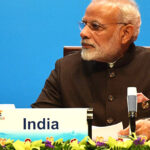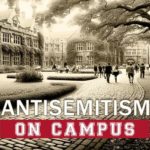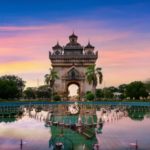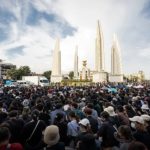
After whirlwind protests that saw thousands of people take to the streets of Bangkok on Tuesday, Oct. 14, the next morning saw the Royal Thai government issue a “severe” emergency decree while at the same time arresting more than 20 people, including Anon Nampa, a human rights lawyer and one of the leaders of the student-led anti-government protesters on charges of sedition. Under the new emergency decree, gatherings of more than five people have been banned, and the publication of news and information that “could create fear” or “affect national security.” The new decree went into effect in the early hours of the morning on Oct. 15, and noted that “as it has appeared that there have been several groups inviting, inciting and committing illegal assembly,” a reference to the thousands of people who had shown up outside Government House to demand the resignation of Thai Prime Minister Prayuth Chan-ocha.
At issue now are two important developments, first the extent to which the government will attempt to enforce the decree in the coming days and weeks and the extent of the resistance on the part of anti-government protesters. As of the evening of Oct. 15, thousands have filled the streets near Ratchaprasong in central Bangkok, the site of the Red Shirt protests in central Bangkok more than ten years ago. The emergency decree is the continuation of the Emergency Decree on Public Administration in Emergency Situation from 2005, which the government has been using as a basis for combating the spread of the COVID-19 pandemic.
The Media
The emergency decree applied in the context of the anti-government protests is problematic, as authorities have the ability to impose censorship on a range of media outlets, crippling media freedom and free expression. Numerous international and domestic broadcasts have already been blocked at times, from the BBC World Service, and Voice TV, a popular local channel critical of the government has been targeted by the government recently on the same grounds. Prior to the public protests earlier last month, more than 2,000 websites were blocked by Thai authorities. In the past, the National Broadcasting and Telecommunications Commission targeted Voice TV prior to the March 2019 elections. It is owned by Panthongtae Shinawatra, the son of former Prime Minister Thaksin Shinawatra.

However, traditional and social media censorship in Thailand is nothing new. Since the military junta took over control of the government in a May 2014 coup, authorities have used their leverage to crackdown on freedom of expression in the media. The National Council for Peace and Order (NCPO), the former official name for the military junta, passed a series of orders that it deemed were necessary to protect national security and the monarchy, as well as curtail public criticism. For example, NCPO orders 97/2557 and 103/2557 prohibited media and individuals from distributing information on all forms of media regarded as “malice,” “false information,” or aimed at discrediting the junta. It also summoned at least dozens of reporters for “attitude adjustment” and prosecuted several reporters on politically-motivated charges.
Prior to the March 2019 election, the government set up a “war room” to monitor social media posts to determine if any breached some of the junta’s rules. The Deputy Secretary-General of the Thai Elections Commission said that the government was only looking for posts that “spread lies, slander candidates or use rude language.” The government has in the recent past tried to derail content on social media that it deemed controversial or damaging to the credibility of the monarchy, without much success. A partial or complete ban on social media, would have wide-ranging consequences, and could trigger a larger public backlash.
Repressive environments have become commonplace in the Thai media landscape and it is difficult to determine how strictly the government will enforce the new decree. Even under past media controls, established media organizations have continued to conduct investigations.
The Individual
Thailand is now under two emergencies, one related to COVID-19, the other related to the anti-government protests. Thursday’s emergency decree came a day after protesters gave the three-finger anti-dictatorship salute to the passing convoy carrying Queen Suthida and Prince Dipangkorn Rasmijoti and after protesters rallied at Government House Tuesday evening. The government has cited the obstruction of the Royal motorcade as one of the reasons for the imposition of the emergency decree, although several of the officials in charge on Tuesday have been removed from their posts. The decree grants broad powers to the government to arrest individuals like Anon Nampa and detain them without charge. Nampa was taken to Chiang Mai by authorities without the presence of a lawyer. It does not provide access to legal counsel or allow visits by family members.
Under Article 11, Prayut can detain “any person suspected of cooperating in an action that leads to an emergency, or any advertiser or sponsor of such actions or the concealing of information about actions that cause an emergency situation.” The government can seize communication equipment, demolish buildings, and more worryingly take actions to “prohibit any citizen from actions that can be considered a threat to national security or the safety of people.” In the space of hours, activists Parit Chiwarak, Jutatip Sirikhan and Panusaya Sithijirawattanakul, were summoned by authorities after participating in a June 5 rally in central Bangkok calling for justice for Wanchalearm Satsaksit, an activist abducted in Phnom Penh in broad daylight earlier this year.
What remains unclear is the depth to which the government will crackdown following the enactment of the decree and the act of defiance by protesters on Wednesday. There are implications and consequences for Prayut and for Thailand’s King Vajiralongkorn, who maintains an active residence in Germany. If protesters are willing to sacrifice themselves for the sake of the collective good, it will be difficult for the authorities to target additional individuals due to the decentralized nature of the protest movement.
Instability in leadership on the part of Prayut also has serious consequences, as speculation has swirled recently about a potential military coup launched in the name of protection of the monarchy, criticism that Prayut has been unable to silence. At the moment, protesters show no sign of yielding to the government, who has now threatened the “use of force” to assist authorities in “terminating the serious situation” under Article 11 of the 2005 decree.






